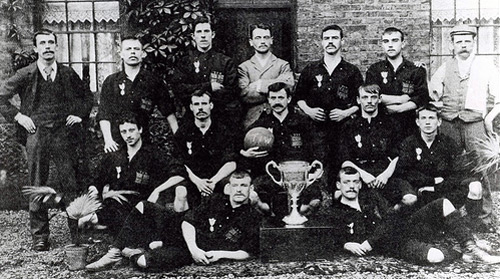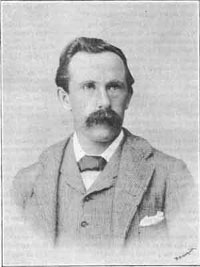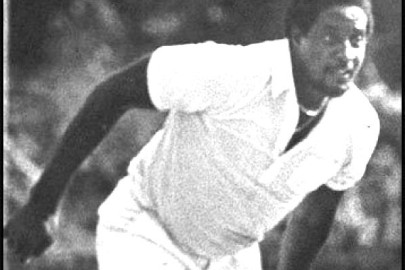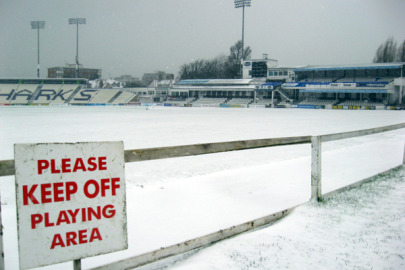Following his look at violence on and off the Edwardian football pitch, James Hamilton now looks back to at two remarkable figures of the Victorian era of soccer…
It’s impossible to scan any list of Victorian and Edwardian footballer’s deaths – like this one…
– James Dunlop, St Mirren — 1892 (tetanus from a cut sustained during a game)
– Joseph Powell, Arsenal — 1896 (infection following a badly broken arm)
– Di Jones, Manchester City — 1902 (gashed knee turning septic)
– Thomas Blackstock, Manchester United — 1907 (seizure after heading a ball)
…without concluding that tetanus and the absence of modern ER were chiefly to blame for most of them. Undiagnosed heart conditions are the big player killers now.
Thomas Bradshaw was different. He died from tuberculosis at Christmas in 1899, playing top level football almost to the end, and his death robbed us of what would have been one of the most intriguing ideological clashes in the history of the game.
 Because Bradshaw was a man for organized labour. He’d been one of an elect group of smart footballers who’d gathered around John Cameron in 1895 Liverpool to found the Association Footballers Union. Did Bradshaw already know at that stage that he was ill? Did he know that he was dying? It’s possible, since the England international and Liverpool player ran for the money almost immediately afterwards, following Cameron to London and Southern League Tottenham Hotspur. Without their drive and inspiration, the nascent union collapsed.
Because Bradshaw was a man for organized labour. He’d been one of an elect group of smart footballers who’d gathered around John Cameron in 1895 Liverpool to found the Association Footballers Union. Did Bradshaw already know at that stage that he was ill? Did he know that he was dying? It’s possible, since the England international and Liverpool player ran for the money almost immediately afterwards, following Cameron to London and Southern League Tottenham Hotspur. Without their drive and inspiration, the nascent union collapsed.
He’d make a second money move, too, in September 1899, to Thames Ironworks, later West Ham. But here it gets interesting, because in 1899 Thames Ironworks were still just about under the thumb of shipbuilder and founder Arnold Hills. And Hills , an FA Cup Finalist in 1877, was the last of the great Victorian footballing philanthropists.
These men were post-Shaftesburyans who, influenced by the American preacher Moody, took the urban poor as their priority. Unlike Shaftesbury and his followers, though, they had football. A game, they thought, that was a damned sight more use than preaching when it came to helping people reorder lives tossed about and disrupted by commerce.
Like Quentin Hogg before him, Hills spent time “undercover” experiencing urban slum life for himself, spending 5 years in a cottage in Canning Town. This was a dangerous game: you paid for that first hand knowledge by playing chicken with endemic typhus, and although the cholera that Hogg had witnessed was gone, smallpox was not. Class was no protection. Every year, doctors, clergymen and volunteers from public schools and high families died alongside the local people. Hills never forgot those days. In 1898, an accident at the launch of one of his ships, Albion, killed 38 people. Hills visited every bereaved home, and paid for every funeral.
By 1899 he’d introduced profitsharing at his works, built a 50,000 capacity stadium for football, athletics, tennis and swimming, and set up facilities for music and theatre for his employees. Although Hills saw sport as participation, not performance, he was alive to how football was changing. It was becoming something you watched more than played, and Hills pioneered floodlit evening games, built a stadium, and (reluctantly) allowed his nascent team to recruit professionals.
That last concession saw Thomas Bradshaw brought in, and with him, another bright young man: Syd King, who, when told to leave 35 years later, killed himself by drinking acid.
You almost feel them swimming their way towards each other: Hills, the top-down philanthropist who could feel his control over his club slipping away as the century entered its last months, and Bradshaw, the smart Liverpudlian who’d come up from the bottom and wanted not charity but rights, negotiations, and treatment as an equal.
They’d have been just in time for each other, but Bradshaw died too quickly. So quickly, indeed, that some kind of explanation is required. Consumption would take five years to kill Katherine Mansfield and George Orwell, not the three months Bradshaw was given. So rumours of a lingering injury to Bradshaw’s head from his Liverpool and England days come into play.
A head injury would kill Manchester United’s Thomas Blackstock eight years later. When the club witheld the family’s insurance money, his angered colleagues set up the players’ union which still survives today. But by then, Thames Ironworks had reformed as West Ham, out of Arnold Hills’ control. And Hills’ own undiagnosed illness had caught up with him, consigning him to a wheelchair. He’d linger on in it, long enough to see the club he’d founded join the Football League and play at Wembley stadium.













A great insight into those lives. Funny, but the Victorian era – despite no longer being the day before yesterday, i.e. a time your grandparents might have known through their parents – seems more and more recognisable. Just about everything we face today was also faced, debated and fought over by the Victorians.
I guess as it’s receded into history we’re less eager to define our own day in contrast to it. It’s more obviously the era that gave birth to our own.
James, this is as fascinating as your earlier posts.
You wonder whether Bradshaw was aware of serious health problems as early as 1895. If he had contracted tuberculosis in that year, and, like Mansfield and Orwell, was destined to survive for about five years, what impact would a worsening TB have had on his ability to play at such a high level? And how many team mates would he have infected? It’s interesting that he transferred to Thames Ironworks only three months before his death – pre-transfer medicals were perhaps carried out in a very casual manner. And did his transfer date almost coincide with the formal diagnosis of TB you refer to. I wonder if you’ve put your finger on it when you raise the question of head injury.
Hills’ story is fascinating. What a great man. The story behind the accident at the ship yard is worth a post of its own.
fascinating stuff! very interesting read
Despite little or no interest in football history I was gripped by this and read to the very end. Fascinating stuff.
Hear hear.
I know that James had to painfully squeeze this story down to a reasonable blogpost length… there’s plenty more to be told….
Yes, absolutely fascinating. I once read that “Mad” Frankie Fraser was made captain of his football team when he was a lad, to keep him out of trouble, like.